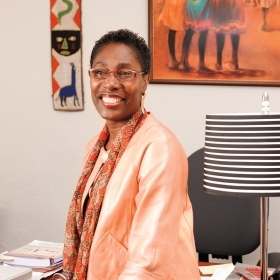In “The Story of Yingying,” a tale penned during the medieval period in China, a young scholar named Zhang meets and becomes intrigued by Cui Yingying, a maiden from a good family. Yingying initially resists Zhang’s advances, but when she eventually offers herself to him, Zhang rejects her. He later receives a moving letter from her in which she passionately declares her love. Zhang still decides to end the relationship, and they both marry other people. In the end, the narrator and other characters seem to agree that Zhang should be praised for avoiding a relationship with a woman as passionate as Yingying.
Not exactly the stuff that makes a Wellesley woman’s heart sing. But for Sarah Allen, assistant professor of Chinese, “The Story of Yingying” represents what she loves about studying eighth- and ninth-century stories written in classical Chinese.
Allen says it’s important to understand the difference between classical Chinese (also called literary Chinese) and modern vernacular Chinese. Classical Chinese was the main language in China before the early 20th century, and within China, it served as a lingua franca. Allen first studied classical and modern Chinese as a junior at Harvard (she initially thought she would major in physics), and she earned her Ph.D. in East Asian languages and civilizations.
In October 2014, Allen published Shifting Stories: History, Gossip, and Lore in Narratives from Tang Dynasty China, which explores the literary tales of medieval China. Allen first became interested in these stories—which are filled with gossip about elite members of Chinese society, and stories of animals and ghosts transforming into women who seduce men—simply because they were fun to read. But she chose them as the subject of her book (and dissertation) because of the intellectual problems they presented. She asked questions such as: Where exactly did the writer come from? Why did someone want to write down this particular story? Beyond the story itself, what was the writer trying to preserve?
Allen says these tales often bring women into the picture in ways that other early Chinese literature doesn’t. The author of “The Story of Yingying” includes Yingying’s letters and poems in the story, thus offering readers her perspective and voice. “Women’s views are typically described or presented as having a more limited range of expression or feeling or purpose,” Allen says. “I think what’s remarkable about the story is that it gives us a much more complex view of women—a teenage girl in particular—than you find in many other places.”







We ask that those who engage in Wellesley magazine's online community act with honesty, integrity, and respect. (Remember the honor code, alums?) We reserve the right to remove comments by impersonators or comments that are not civil and relevant to the subject at hand. By posting here, you are permitting Wellesley magazine to edit and republish your comment in all media. Please remember that all posts are public.